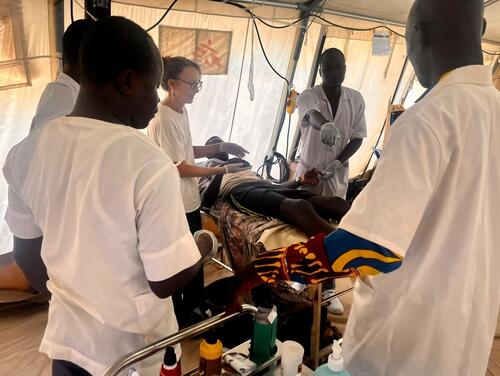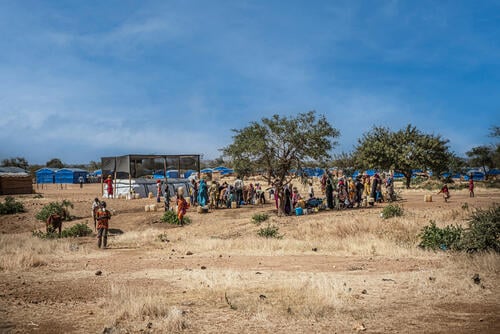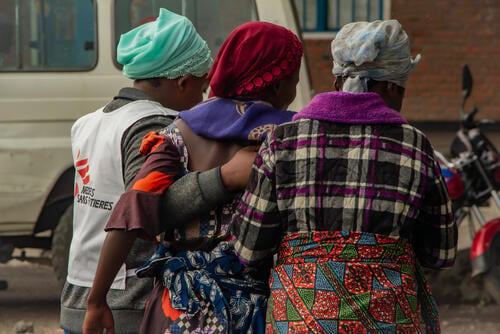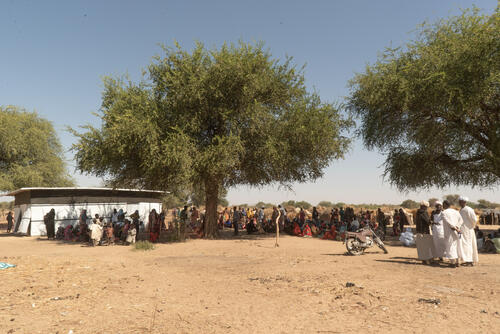Following increased fighting in El Geneina in Sudan’s West Darfur, Médecins Sans Frontières (MSF) teams working across the border in eastern Chad have seen an immediate and major increase in the number of people arriving in the region. Refugees coming from Sudan are mainly women and children, and recount stories of large-scale violence against civilians.
“In the first three days of November, we have seen more new arrivals of Sudanese refugees than during the whole previous month; about 7,000 people crossed the border,” explains Stephanie Hoffmann, MSF outreach coordinator. “We have seen mothers and children who had to leave Sudan with nothing, as their homes were being destroyed.”
In a health post right at the border crossing in Adré, a Chadian city on the border with Sudan, MSF teams provide medical services to the newly arrived refugees. Our teams vaccinate children against measles, screen for malnutrition, and refer those in need of urgent specialised healthcare directly to Adré hospital, where they are being treated by MSF and staff from the Chadian Ministry of Health.
A few hundred metres from the border crossing, refugees wait for new arrivals from Sudan, hoping to get news of their families. Often, they learn about the loss of their loved ones back home in Sudan. MSF teams now also offer mental health support to people in distress at the crossing and have installed a water tank to provide safe drinking water after the gruelling journey.
We continue to call for an immediate scale-up of humanitarian aid... and to ensure access to basic services such as water, healthcare, shelter and food.Claire Nicolet, head of MSF emergency response for Chad and Sudan
“Last night, my sister’s house was bombed,” says Amne, who crossed the border with her four children. “It was next to ours. Our house caught fire from the explosion, and we immediately got out. I do not know what happened to my sister, whether she survived or not.”
Amne points to her dress, saying that it is the only possession she was able to bring with her.
At the MSF hospital in Adré, a 27-year-old man arrives. He fled El Geneina with 16 other people, but their group was attacked on the road to Chad. He tells us that the attackers killed everyone else, but he survived by playing dead. Eventually a new group of refugees arrived and helped him reach the border. He has multiple bullet wounds on his hands and legs.
“El Geneina experienced a nightmarish escalation of violence last June, and it pushed a large proportion of the city's inhabitants to flee to Chad, despite the many dangers and attacks that awaited them on the road,” says Alkassoum Abdourahamane, MSF project coordinator in El Geneina. “The city then experienced a relative lull and even hosted displaced people from other locations. Now, the blasts and the fear have once again taken over.”
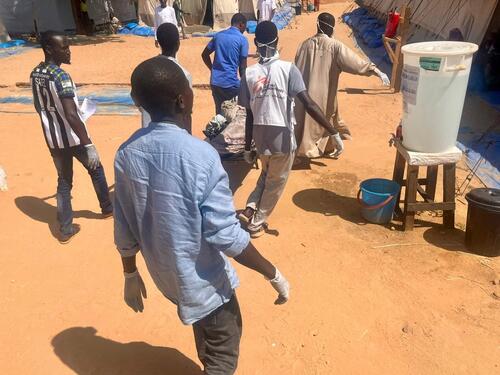
On Sunday, MSF donated 3.5 m3 of medical equipment to the emergency unit of the El Geneina Teaching Hospital. Already, these supplies have helped to treat 120 patients. The team has also made donations to three health centres on the road between El Geneina and Adré, providing kits to treat malaria, diarrhoea, and respiratory infections in both adults and children.
The stories of the latest arrivals echo those of the massive numbers of refugees who reached Adré in June, when the population of the small town tripled. From 15 to 17 June, the hospital received over 850 war-wounded people. Many patients suffering gunshot wounds, particularly to the abdomen, back and legs, reported harrowing violence in El Geneina and attacks on the road to Chad, with armed men who shot at people fleeing.
Meanwhile, our teams in the North Darfur capital of El Fasher have been witnessing significant numbers of people leaving the city, for fear of finding themselves trapped by the growing violence.
Since the war in Sudan started in April over six months ago, millions of people have been forced to flee, leaving behind their homes and livelihoods. While most are still in Sudan, an estimated 1.1 million people have crossed the border into neighbouring countries. The majority of these are now in Chad, a country already facing multiple humanitarian crises.
“Despite the collective efforts of local communities, authorities and humanitarian organisations, the humanitarian response doesn't yet match the magnitude of the crisis in eastern Chad, which is also putting a strain on vulnerable host communities,” explains Claire Nicolet, head of MSF emergency response for Chad and Sudan. “Many people are living in makeshift camps where conditions remain dire.”
“Meanwhile the latest increase in refugee arrivals is another indication that needs are continuing to grow and that the conflict fuelling them is far from over,” says Nicolet. “We continue to call for an immediate scale-up of humanitarian aid to help the most vulnerable, both refugees and Chadians, and to ensure access to basic services such as water, healthcare, shelter and food.”
MSF teams are delivering vital medical care in Adré, Ourang, and Metche camps in Ouaddai province, as well as in the Goz Achiye, Daguessa and Anderessa camps located in the Sila province border region.



